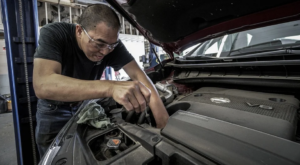Regular maintenance of machines is vital to ensure they are functioning efficiently. The machine’s lifetime is also prolonged without causing a reduction in their level of productivity and safety to the operators. Some of the industries that rely on heavy machines include mining, farming, and manufacturing. The heavy machines require professional maintenance due to the different and complex parts that determine the overall functioning. Besides, you should buy parts for repair or replacement from genuine dealers. For example, you can get quality high-quality belts and pulleys from the best rubber belt distributor. The following tips will guide you on how to maintain your machines.
Add and Test Lubricants Regularly
 Lubricants reduce the friction between the machine parts when it is operating and hence reducing wear and tear. It also prevents rust which damages machine parts. Good lubrication not only extends the life of machinery equipment and components but also increases efficiency.
Lubricants reduce the friction between the machine parts when it is operating and hence reducing wear and tear. It also prevents rust which damages machine parts. Good lubrication not only extends the life of machinery equipment and components but also increases efficiency.
There are specific grease and oil for every part, and paying attention to this detail ensures that the lubricant you are applying is helpful. You can regularly check for signs of excess lubricant on pistons and leaks around oil seals. Regular lubricant checks are a great way of diagnosing problems before they escalate.
Have a Maintenance Schedule and Keep Records
The different parts of a machine need different maintenance schedules depending on how often they wear and tear. You can work with a machinery maintenance professional to set up an effective maintenance schedule. Some of the parts that require regular checks are electrical systems, tires, and fluids. Regular maintenance can save you many costs like production downtime, replacement of machinery parts, and constant buying of new equipment. Keeping good records of the maintenance routine is also crucial in addressing persistent issues and following up on the costs incurred in maintaining the machinery.
Conduct Operator Training
The training level that your employees have determines how they handle the machinery. Different types of machinery require different training needs. Equipping the employees with the right skills and knowledge needed by the respective machinery can prolong its life and productivity. You can do this through regular training and giving them the operating manuals. Machine operators who have the necessary knowledge and skill can help detect arising problems in the machine parts, which saves you the cost of regular repair and replacements. Good handling of the machinery prolongs its life and productivity.